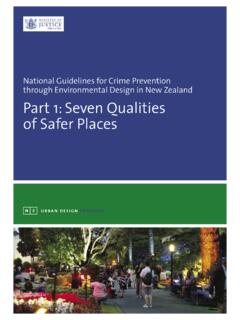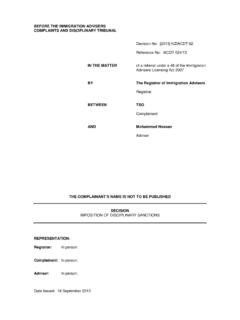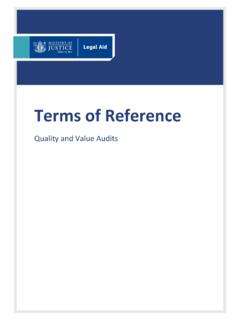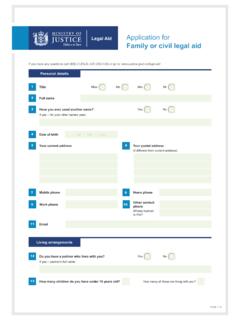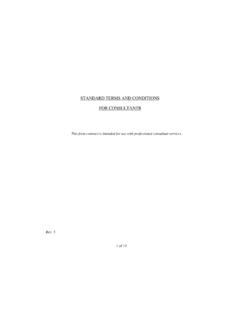Transcription of Saying No to Bribery and Corruption – A Guide for New ...
1 Saying No to Bribery and Corruption A Guide for New Zealand Businesses FOREWORD Bribery and Corruption cause serious social, economic, and political problems and New Zealand is committed to playing its part in the global fight against this damaging conduct. This Guide is intended to provide New Zealand businesses of all sizes with useful information on a range of topics related to anti- Corruption compliance. This includes details of relevant domestic and foreign Corruption laws; international anti- Corruption agreements; and guiding principles on how to establish, implement, and maintain effective anti- Corruption compliance procedures. It is part of a suite of resources published by the Ministry of Justice, which includes: Facilitation Payments and New Zealand s Anti- Bribery Laws How to create a fraud and Corruption policy. The Ministry produced this Guide in consultation with the Serious Fraud Office (SFO) and other government agencies, with valuable input from experts in the private sector and civil society.
2 We hope that it will be a useful Guide for New Zealand businesses, individuals and others interested in keeping New Zealand Corruption -free. INTRODUCTION Corruption is a global problem that damages businesses, markets, democratic institutions, and the social fabric of society. Widespread Corruption undermines the rule of law and erodes justice, driving other domestic and transnational crimes such as trafficking in people, weapons and Corruption is also bad for business. It distorts prices, reduces competitiveness, introduces uncertainty and risk into the market, and erodes fair and transparent business practices. When it involves the public sector, it can divert resources away from key priorities such as education, health, and infrastructure, which in turn impacts economic and social development. Bribery and Corruption in connection with international trade is now the focus of a number of international conventions, underlining the growing recognition that Corruption is a substantial barrier for economic and social development.
3 The past two decades have seen the development of the OECD Convention on Combating Bribery of Foreign Public Officials in International Business Transactions (OECD Anti- Bribery Convention), the United Nations Convention Against Corruption (UNCAC) and the Asia Pacific Economic Cooperation s (APEC) Santiago Commitment to Fight Corruption and Ensure Transparency. New Zealand is a signatory to each of these and has also recently strengthened its domestic anti- Corruption frameworks by passing the Organised Crime and Anti- Corruption Legislation Bill (the Organised Crime Bill). New Zealand has robust anti- Corruption laws and the SFO is committed to proactively detecting, investigating and prosecuting both public and private sector Corruption . However, the private sector also has an important role to play in solving this global problem. New Zealand businesses trade on our hard-earned reputation as one of the least corrupt countries in the world.
4 However, we cannot afford to become complacent and businesses should continually work to prevent and address this threat through a top-level commitment to a culture of zero tolerance. Such commitment begins with the implementation of strong compliance systems. Effective internal controls, ethics, and compliance programmes, including a clearly articulated anti- Corruption policy are 1 Maryse Tremblay & Camille Karbassi, Corruption and Human Trafficking 4, Transparency International, Working Paper No. 3, 2011 essential to minimising or preventing the costs, legal consequences and reputational damage associated with Corruption or the perception of Corruption within your organisation. The information in this Guide reflects international best practice and applies equally to small, medium and large scale organisations. The Corruption risks facing an organisation vary greatly depending on its size, type, legal structure, and location and sector of operation.
5 Therefore, a key theme in this Guide is that businesses must implement anti- Corruption procedures that are proportionate to the risks they face. New Zealand s business landscape is predominantly made up of small to medium-sized commercial organisations with domestic operations and limited resources. Anti- Corruption compliance is equally important and beneficial for these types of businesses, and need not be cumbersome and expensive. Combating Bribery and Corruption should be a priority for any organisation that cares about its future. While no compliance programme can completely remove the risk of Corruption , following the principles set out in this Guide will go a long way to helping your business implement effective and proportionate procedures to prevent, detect and appropriately respond to Corruption . DEFINITIONS AND EXAMPLES OF Bribery AND Corruption There is no legally binding definition of Corruption in New Zealand.
6 However, the SFO relies on Transparency International s definition of Corruption as the abuse of entrusted power for private gain. Corruption often involves Bribery , which generally speaking, is the giving or receiving, whether directly or indirectly, of something of value to influence a transaction. Bribery and Corruption can take many forms including: Payment, receipt or solicitation of bribes or secret commissions (kickbacks) Manipulation of tendering or procurement processes Undisclosed conflicts of interest Wilful blindness in respect of the activities of agents overseas. This is particularly relevant to organisations with a presence in the and (see below section on overseas anti- Corruption legislation ) Failure to put in place adequate systems and controls to mitigate the risk of Bribery (again, particularly relevant to organisations with a presence in the and ) Extravagant corporate hospitality or gifts Undisclosed giving or receiving of gifts Practical examples of Bribery and Corruption Offering a New Zealand customs officer a payment for approving the import of a product sold by your company.
7 A company in New Zealand paying a public official in another country a sum of money to secure clearance to launch a product in that country. A foreign agent of New Zealand company bribes the procurement manager of a state owned manufacturing plant to secure an order for goods from the New Zealand company. RELEVANT ANTI- Corruption LEGISLATION New Zealand businesses, particularly those operating abroad, need to be aware of the overlapping laws that may apply to their operations. In addition to New Zealand legislation, businesses should familiarise themselves with the laws of the local jurisdiction(s) in which they operate, and also any applicable long-arm laws, principally those of the United States Foreign Corrupt Practices Act 1977 ( FCPA) and the United Kingdom Bribery Act 2010 ( Bribery Act). NEW ZEALAND LEGISLATION Scope and Jurisdiction New Zealand criminalises Bribery and Corruption in both the public and private sectors, challenging traditional conceptions that Corruption is purely a public sector issue.
8 Importantly, all of New Zealand s Bribery and Corruption offences apply to individuals and legal persons. This means that an act of Bribery or Corruption committed by an employee, agent or other intermediary on behalf of an organisation may result in a prosecution against the individual in their personal capacity, as well as a prosecution against the organisation. This is important, as seeking accountability from individuals who perpetrate illegal or unethical acts is one of the most effective ways to tackle corporate Further, all Bribery and Corruption offences apply both domestically and extraterritorially. This means that the SFO can prosecute New Zealand citizens, residents, and entities incorporated in New Zealand for acts of Bribery and Corruption that occur wholly outside of New Zealand, including when the bribe is paid through a foreign intermediary. Private sector Corruption Secret Commissions Act 1910 The Secret Commissions Act contains Bribery and Corruption style offences relevant to the private sector (though also relevant to public sector employees and contractors).
9 The key Corruption offence criminalises the bribing of an agent (for example, someone who works on behalf of a principal). Generally speaking, it is an offence to corruptly give, agree, or offer to give, an agent a gift or other consideration so as to induce or reward an agent s actions with respect to their principal s (for example, client s or employer s) affairs or Other Secret Commissions Act offences include:4 failure of an agent to disclose to their principal a financial interest in a contract provision of a false receipt to an agent with intent to deceive a principal receipt of a secret reward for advising someone to enter a contract. The Organised Crime Bill increased the maximum penalties for all Secret Commissions Act offences to 7 years imprisonment or an unlimited fine for individuals. Corporations are also liable to an unlimited fine. Public Sector Corruption Crimes Act 1961 Generally speaking, Bribery under the Crimes Act occurs when a person corruptly gives, receives, accepts or obtains a bribe (whether directly or indirectly) for themselves or any other person, with intent to influence that person to act or refrain from acting in their official capacity.
10 A bribe may involve money, gifts, or any other benefit. For example: Money cash, vouchers, allowances Payments of expenses - school fees, medical bills Favours offers of housing, employment Preferential treatment discounts, rebates, refunds Corporate hospitality gifts, entertainment, travel (a) Domestic Bribery and Corruption Sections 100-105 of the Crimes Act criminalise Bribery and Corruption of New Zealand judges, government ministers, members of Parliament, police officers and other public officials. It is also an offence to corruptly use official information or to trade in influence (for example, accept a bribe in return for using one s 2 See 2015 memo from the Department on Justice on Individual Accountaibility for Corporate Wrongdoing . 3 Section 3 of the Secret Commissions Act 1910. 4 Sections 5, 6 & 8 of the Secret Commissions Act 1910 respectively.)
